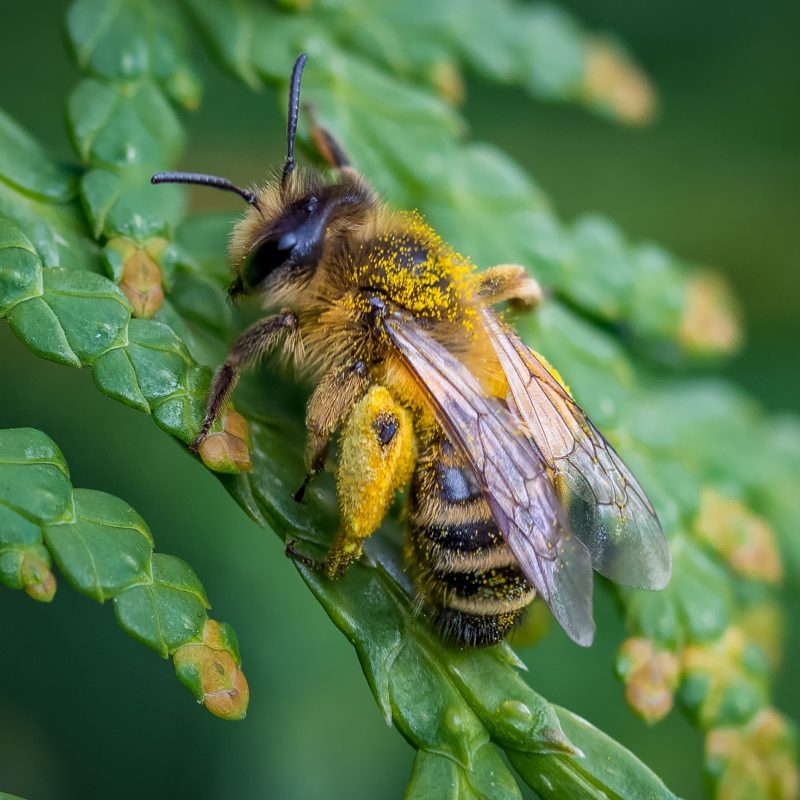The problem
A relatively new class of pesticides, neonicotinoids (neonics for short), has been implicated in the decline of bees and other pollinators.
The questions
 Are these chemicals used in the production of seed for home gardens and if so, is this use affecting pollinators?
Are these chemicals used in the production of seed for home gardens and if so, is this use affecting pollinators?
Background on neonicotinoid use in seed treatments
Fact: The Home Garden Seed Industry does not treat packaged seed with any type of neonicotinoids. Corn and soybean seeds sold in bulk for farm use are sometimes treated with a mix of neonics, for the convenience of large farmers. According to ASTA (America Seed Trade Association) these bulk seed treatments enable farmers to realize “healthier crops and higher revenues.” Residues from these treatments can persist in the soil, and it was concern about these soil residues that prompted the EPA to assess the benefits of neonicotinoid seed treatments. The agency concluded that, for soybeans at least, there is little or no overall benefit to these treatments (1). The ASA (American Soybean Association) is contesting this conclusion.
The connection between neonics and the decline of bees
In some ways, neonicotinoids are an improvement over pesticides used in the past. They are safer for the people applying them, and for other mammals and birds. The connection between the proper use of these chemicals and bee decline is being investigated. At present, the consensus is that the use of neonics is one factor among many that may be contributing to the decline of bees. Others include loss of habitat, mites, malnutrition, pathogens, genetic factors, immunodeficiencies, and changes in beekeeping practices.
Seed producers depend on bees
Can these pesticides be useful in producing seed? “We use pesticides on occasion, when needed,” says Patty Buskirk, one of the largest home garden seed producers in the country. She stresses that proper, sparing use is safe for bees. “Seed producers depend on bees. Why would we risk harming them?” Annual plants—tomatoes, peppers, bedding plants, lettuce, and most of the other plants home gardeners grow from seed—do not benefit from neonics, Buskirk explains. This class of pesticides can sometimes be useful in controlling pests on perennial seed crops, and long-season biennial crops such as onions. But keep in mind that in order to produce seed, growers must allow their crops to flower and be pollinated, so attention to proper use of pesticides is an imperative.
Buskirk’s main contracted seed grower is home to an apiary consisting of 6000 bee colonies. Their health and safety is necessary to seed production, and a primary concern. On the infrequent occasions when pest control is warranted, pesticides are used according to specific guidelines. The product label on Imidacloprid, a neonic with a wide variety of uses, states: “Do not apply this product or allow it to drift to blooming crops or weeds if bees are visiting the treatment area.”
How neonics work
Imidacloprid, the most widely used chemical in this class, disrupts the nerve’s ability to send a normal signal. It is much more toxic to insects than to mammals and birds because it binds better to the receptors of insect nerve cells. Plants take imidacloprid up from the soil or through the leaves and it spreads throughout the plant into stems, leaves, fruit, and flowers. Insects that chew or suck on the treated plants eat the imidacloprid as well. Used by homeowners on lawns as a grub treatment, this pesticide can last for months in soil. It is broken down rapidly when exposed to water and sunlight, but residues can become more tightly bound to the soil with time. Plants grown in treated soil have been shown to have low levels of neonic residues in their nectar and pollen (2).
The bottom line for home gardeners
1) You will not find neonic-treated seeds on any retailer’s shelf.
2) As the debate about whether neonics should or should not be allowed in agricultural settings continues, homeowners need to be aware of their own pesticide use. A case study by Xerces Society showed that homeowners can apply 12 to 16 times the amount used in an agricultural setting! Use pesticides only when necessary, and according to package directions.
*Article accedited to the Home Garden Seed Association.
